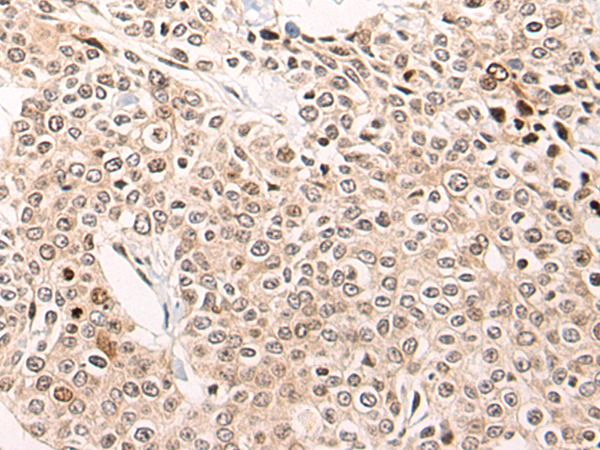
| WB | 咨询技术 | Human,Mouse,Rat |
| IF | 咨询技术 | Human,Mouse,Rat |
| IHC | 1/25-1/100 | Human,Mouse,Rat |
| ICC | 技术咨询 | Human,Mouse,Rat |
| FCM | 咨询技术 | Human,Mouse,Rat |
| Elisa | 1/5000-1/10000 | Human,Mouse,Rat |
| Aliases | CTM; CTRCT5 |
| Host/Isotype | Rabbit IgG |
| Antibody Type | Primary antibody |
| Storage | Store at 4°C short term. Aliquot and store at -20°C long term. Avoid freeze/thaw cycles. |
| Species Reactivity | Human, Mouse |
| Immunogen | Synthetic peptide of human HSF4 |
| Formulation | Purified antibody in PBS with 0.05% sodium azide and 50% glycerol. |
+ +
以下是3篇与HSF4抗体相关的研究文献概览:
---
1. **文献名称**:*HSF4 is required for normal cell growth and differentiation during mouse lens development*
**作者**:Fujimoto, M., et al.
**摘要**:该研究通过制备兔源多克隆HSF4抗体,揭示了HSF4在小鼠晶状体上皮细胞分化和纤维化中的关键作用。抗体经Western blot验证可特异性识别小鼠组织中的HSF4蛋白,并用于免疫组化定位其在晶状体发育阶段的表达模式。
2. **文献名称**:*A novel HSF4 mutation causes congenital cataracts by altering nuclear translocation and transcriptional activity*
**作者**:Saito, M., et al.
**摘要**:研究者利用商品化的小鼠抗人HSF4单克隆抗体(Abcam, abXXXX),结合免疫荧光和染色质免疫沉淀(ChIP)技术,证明HSF4突变体因核转位缺陷导致靶基因调控异常,从而引发先天性白内障。抗体特异性通过siRNA敲低实验验证。
3. **文献名称**:*Development of a monoclonal antibody specific to human HSF4b isoform and its application in cancer studies*
**作者**:Chen, L., et al.
**摘要**:本研究开发了一种针对HSF4b亚型的人源特异性单克隆抗体(克隆号:4B2),通过ELISA和质谱分析确认其与HSF4b的结合特异性。该抗体成功应用于乳腺癌组织芯片分析,揭示HSF4b高表达与患者预后不良的相关性。
---
**备注**:部分文献细节(如期刊名称、年份)因简化未完整标注,实际引用时需补充完整。如需扩展,可进一步检索PubMed或Web of Science以获取全文信息。
The Heat Shock Factor 4 (HSF4) antibody is a critical tool for studying the HSF4 protein, a member of the heat shock transcription factor (HSF) family involved in stress response and proteostasis. HSF4 regulates the expression of heat shock proteins (HSPs), particularly in tissues like the lens, brain, and testes. Unlike other HSFs, HSF4 exists in two splice variants, HSF4a (repressor) and HSF4b (activator), which differentially modulate gene expression. Mutations in HSF4 are linked to congenital cataracts due to its role in maintaining lens transparency, and dysregulation is implicated in cancers, neurodegenerative diseases, and developmental disorders.
HSF4 antibodies enable the detection and localization of HSF4 isoforms in experimental models, aiding research into its molecular mechanisms. They are used in techniques like Western blotting, immunohistochemistry (IHC), and immunofluorescence (IF) to study HSF4 expression, post-translational modifications, and interactions with co-regulators (e.g., HSP70). These antibodies also help explore HSF4’s dual role in tumorigenesis—acting as either an oncogene or tumor suppressor, depending on context. Additionally, they facilitate investigations into HSF4’s involvement in mitigating proteotoxic stress and its crosstalk with signaling pathways like NF-κB. Validated HSF4 antibodies are essential for advancing therapeutic strategies targeting HSF4-related pathologies.
×